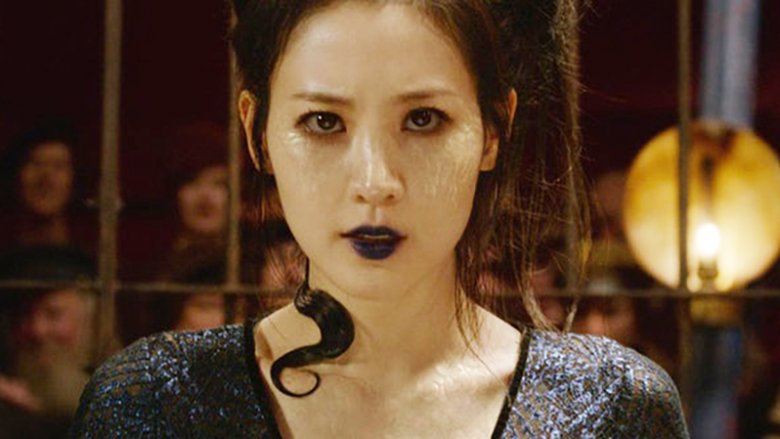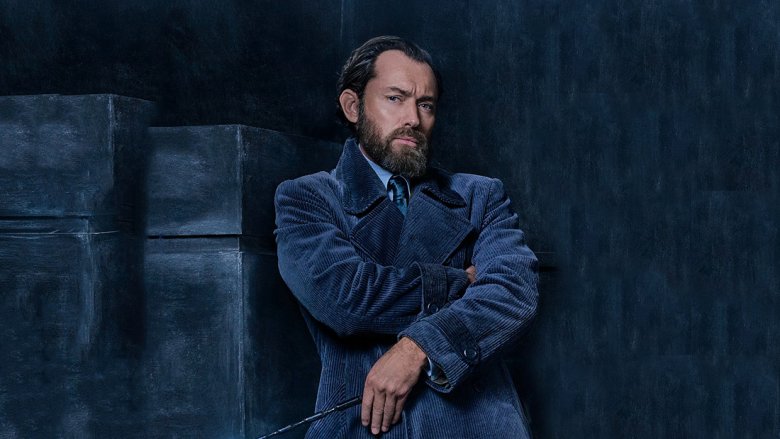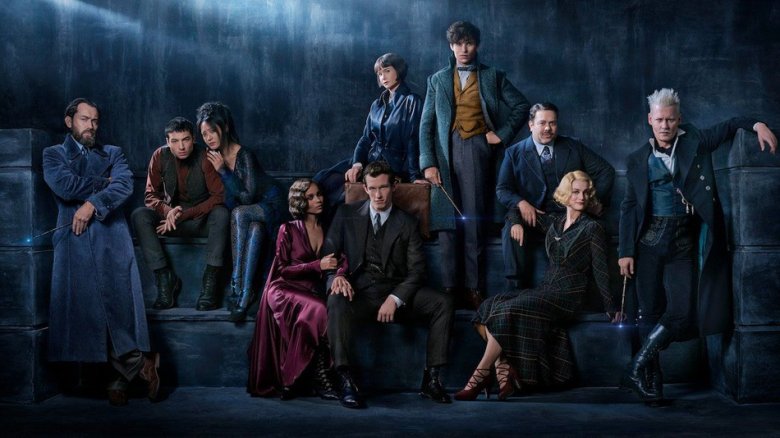J.K. Rowling Responds To Critics After Nagini Controversy Goes Viral
No one expected the final trailer for Fantastic Beasts: The Crimes of Grindelwald to tell them anything they didn't already know from watching previously released teasers and TV spots. But when studio Warner Bros. dropped the last piece of promotional footage on September 25, minds were blown.
About 30 seconds into the trailer, Ezra Miller's character Credence Barebone hisses from behind bars, "Nagini" — the same Nagini Harry Potter fans know as the "deadly snake companion" and Horcrux of the Dark Wizard Lord Voldemort. A Harry Potter spinoff film including the murderous reptile? Cool! Nothing out of the ordinary here! This totally checks out!
However, immediately after Credence utters that well-known name, the camera pans to reveal that Nagini is actually a human woman and a performer in the Circus Arcanus, played South Korean actress Claudia Kim. And that was, well, pretty shocking.
The revelation rocked the Harry Potter fandom and sent shockwaves across social media, where some expressed concern, disappointment, and anger that one of the two actors of color in the Fantastic Beasts franchise will play a "circus performer who turns into a murderous snake," a "literal object owned by a white man inspired by Nazis" who is ultimately beheaded in the final Harry Potter book (and movie).
After the controversy went viral, Harry Potter series author and Fantastic Beasts: The Crimes of Grindelwald screenwriter J.K. Rowling (real name Joanne Rowling) clapped back at critics.
It began when Jen Moulton retweeted a video from Twitter user @arepyong that featured Kim finally stating aloud that she "is Nagini" in Fantastic Beasts: The Crimes of Grindelwald. While @arepyong was amazed at the thought of the Fantastic Beasts sequel portraying Nagini as a human, Moulton and many others were outraged by the fact that Rowling had made Nagini a Korean woman, feeling that Rowling was both lazily and retrospectively shoehorning diversity into the source material where it hasn't ever existed before and perpetuating the "dragon lady" stereotype.
"Listen Joanne, we get it, you didn't include enough representation when you wrote the books. But suddenly making Nagini into a Korean woman is garbage," Moulton wrote, tagging Rowling at the start of her tweet. "Representation as an afterthought for more woke points is not good representation."
Never one to fear engaging in a little social media-set discourse, Rowling came in swift with a comeback to Moulton's judgement.
"The Naga are snake-like mythical creatures of Indonesian mythology, hence the name 'Nagini,'" the author tweeted. "They are sometimes depicted as winged, sometimes as half-human, half-snake. Indonesia comprises a few hundred ethnic groups, including Javanese, Chinese and Betawi. Have a lovely day." For good measure, Rowling tossed in a green snake emoji to punctuate her point.
From there, Indian author Amish Tripathi provided facts that invalidated Rowling's explanation for casting a South Korean actress as Nagini and corrected the mythology she discussed in her tweet.
"Actually @jk_rowling the Naga mythology emerged from India," Tripathi wrote. "It travelled to Indonesia with the Indic/Hindu empires that emerged there in the early Common Era, with the influence of Indian traders and Rishis/Rishikas who travelled there. Nagin is a Sanskrit language word."
Rowling later tweeted that she had been holding the Nagini secret for "around twenty years," but fans weren't buying it. "It's not really a secret, it's more like something you came up with now for the movie," user @JuanMSepulveda1 responded.
As The Daily Dot staff writer Gavia Baker-Whitelaw touched on in her criticism of the Nagini situation, Rowling has amassed a long list of "post-series canon retcons." Perhaps the most famous example of this was Rowling's past admission that she always believed Albus Dumbledore, whose sexuality was never once mentioned or even slightly hinted at in the Harry Potter book series, to be homosexual.
The retcon came in October 2007, roughly three months after Harry Potter and the Deathly Hallows, the final installment in the seven-book series, hit shelves around the world. Rowling revealed at New York's Carnegie Hall during a stop on her U.S. tour that year that she "always thought Dumbledore was gay" after a fan asked her whether he found "true love." The author explained that the legendary wizard actually fell in love with Gellert Grindelwald, a Durmstrang Institute student who was widely considered the most powerful Dark Wizard in history — before Tom Riddle stepped onto the scene and transformed into Lord Voldemort, of course.
"Falling in love can blind us to an extent," Rowling stated, adding that Dumbledore's feelings for Grindelwald were his "great tragedy" and that he was "horribly, terribly let down."
According to Reuters, fans in attendance "fell silent after the admission — then erupted into applause." Rowling reportedly said that if "she had known that would be the response, she would have revealed her thoughts on Dumbledore earlier." Sounds familiar, no?
Since then, many have called Rowling out for queerbaiting, the term that refers to the act of "authors, writers, or showrunners" attempting to "attract an LGBT audience by hinting at same-sex relationships between characters" and/or "adding homoerotic subtext or erotic tension between two character, usually leads" without ever intending to "elevate the subtext to an actual relationship."
Of the Dumbledore-is-gay-declaration, Bustle's Emma Oulton wrote in 2016, "This was in some ways a hugely exciting revelation — but at the same time, it was a bit of a slap in the face. If Dumbledore was always supposed to be gay, then why didn't J.K. Rowling write him that way?"
The Dumbledore controversy gained new energy in January 2018, when director David Yates revealed that Fantastic Beasts: The Crimes of Grindelwald won't make it "explicitly" clear that Dumbledore is gay — despite the purported love of his life being at the center of the sequel's story.
Clearly, the Nagini controversy is yet another storm to have brewed around Fantastic Beasts: The Crimes of Grindelwald, following after the somewhat recent dissension over Johnny Depp's involvement in the movie.
In November 2017, Warner Bros. unveiled the first official cast photo from the film and announced what the sequel to Fantastic Beasts and Where to Find Them would be titled. Now, we aren't psychics or clairvoyants or flies on the walls of the Warner Bros. offices around the world, but we feel confident in saying that the studio probably hoped that the double-whammy reveal would make every Harry Potter fan everywhere happier than a Weasley kid at a buffet table. That, unfortunately, didn't happen.
Upon getting a peek at the Fantastic Beasts: The Crimes of Grindelwald cast picture, countless fans were horrified to see Depp sitting alongside the likes of Newt Scamander actor Eddie Redmayne and young Albus Dumbledore star Jude Law, and were upset that Depp was still on board to play Gellert Grindelwald following allegations that he assaulted his ex-wife Amber Heard. Both Rowling and Yates have gone on the record to defend Depp and stand by the decision to cast him in the film series.
It remains to be seen whether these wars of words will affect how Fantastic Beasts: The Crimes of Grindelwald performs at the box office later this year. (The original Fantastic Beasts managed to pull in $814 million worldwide against a $180 million budget, but that flick had the benefit of being ostensibly controversy-free.) While some have already hinted at their intentions to boycott The Crimes of Grindelwald, others still plan to watch the sequel regardless of all the contention that surrounds it.
Until Fantastic Beasts: The Crimes of Grindelwald launches in theaters on November 16, fans can decide which side of the Nagini controversy they stand on, and J.K. Rowling can take some time to re-evaluate what she should and shouldn't tweet.


